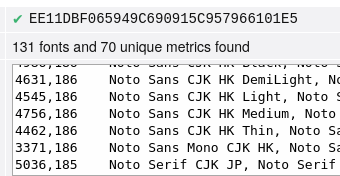this post was submitted on 19 Jul 2024
97 points (100.0% liked)
Privacy
40863 readers
2447 users here now
A place to discuss privacy and freedom in the digital world.
Privacy has become a very important issue in modern society, with companies and governments constantly abusing their power, more and more people are waking up to the importance of digital privacy.
In this community everyone is welcome to post links and discuss topics related to privacy.
Some Rules
- Posting a link to a website containing tracking isn't great, if contents of the website are behind a paywall maybe copy them into the post
- Don't promote proprietary software
- Try to keep things on topic
- If you have a question, please try searching for previous discussions, maybe it has already been answered
- Reposts are fine, but should have at least a couple of weeks in between so that the post can reach a new audience
- Be nice :)
Related communities
much thanks to @gary_host_laptop for the logo design :)
founded 5 years ago
MODERATORS
you are viewing a single comment's thread
view the rest of the comments
view the rest of the comments

IIRC, it actually goes deeper than just reporting what fonts are installed. Even if the font names and metrics are masked by the browser, scripts can render them to a canvas and sample the resulting pixels.
This is why I don't install any custom fonts where a web browser can use them, and part of why I keep javascript disabled by default.
Out of curiosity, how much of the internet is unusable with js disabled? As in, how often do you run into sites that are essentially non-functional without?
I haven't taken measurements, but there are many problematic sites these days. Lots of web developers fail to see the problems that javascript imposes on users, so they build web apps even when they're serving static content, where a regular web site (perhaps with javascript enhancements that aren't mandatory) would do just fine.
I selectively enable first-party scripts on a handful of sites that I regularly use and mostly trust (or at least tolerate). Many others can be read without scripts using Firefox Reader View. I generally ignore the rest, and look elsewhere for whatever information I'm after.
Thank you for the information! I kind of suspected it'd be like that tbh,
Don't bother https://noscriptfingerprint.com/
There's also TLS-based fingerprinting which cloudflare uses to great success, no html/css/js even needed for that.
Quite a lot actually. A lot of articles / blogs / news sites are actually more usable without javascript than with, because none of the annoying popups and shit can load. I suggest having two browser profiles: one with javascript enabled by default, and one with javascript disabled. So for things like online shopping, you'd open the js profile. And for things where you expect to do a lot of reading, use the nojs profile. Ublock origin also lets you temporarily enable/disable js for a particular website pretty easily.
I wonder if running it in a container such as flatpak would help.
Flatpak is not a container and should not be thought of as such for security/privacy purposes:
https://flatpak.org/faq/#Is_Flatpak_a_container_technology_
It can provide container-like functions if specifically configured for that, but that's not normal and it shouldn't be relied on as a security barrier.
I would not count on it, since it's required for proper theme integration. A quick search confirms my suspicion: some font direcories are mapped.
I quite like the idea though, sort of a lite qubes or unmodified VM for all Firefox Flatpak users could be nice.
In a perfect world, it would be nice to have a checkbox per app where I can select whether it should share anything with the system libraries.
Not sure whether it can fix the font problem, but in general Flatseal allows you to customise permissions for installed flatpaks.
https://flathub.org/apps/com.github.tchx84.Flatseal
I'm running Brave and Librewolf from flatpak. Nope, it doesn't help, at least with default sandbox settings.